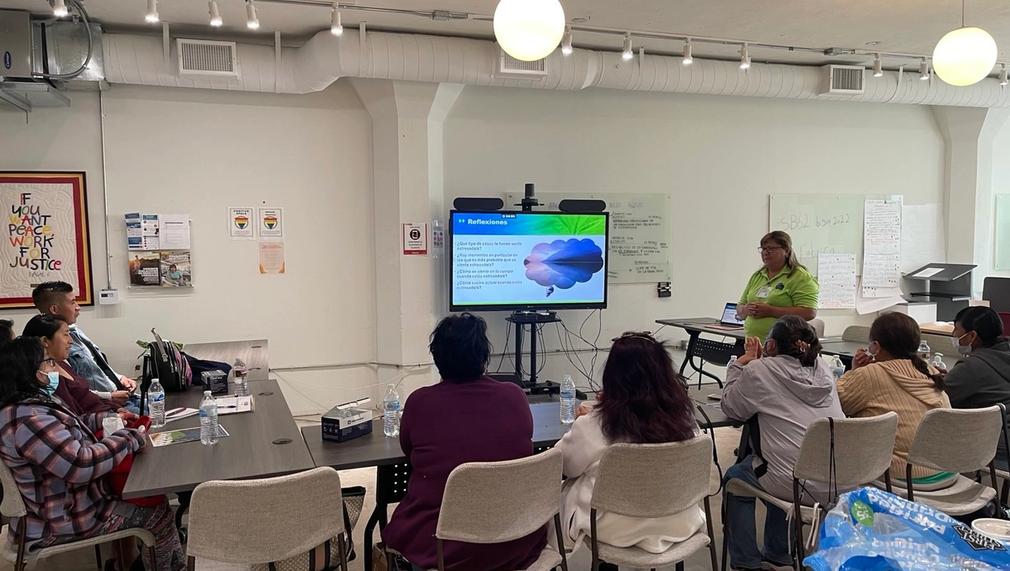Garment Worker Resilience & Well-Being Project
This project will provide foundational mental health and wellness support to garment workers through a culturally relevant workshop series. Grounded in mutual aid, the program also fosters collective care practices—such as income-generating projects, asset mapping, and political education—that challenge individualistic economic models and promote community resilience.

What is the primary issue area that your application will impact?
Community safety
In which areas of Los Angeles will you be directly working?
Central LA East LA South LA San Gabriel Valley Gateway Cities
In what stage of innovation is this project, program, or initiative?
Expand existing project, program, or initiative (expanding and continuing ongoing, successful work)
What is your understanding of the issue that you are seeking to address?
Garment workers in Los Angeles, many of whom are undocumented, continue to face acute challenges including food and housing insecurity due to pervasive wage theft, inflation and the post-COVID economic landscape. In a 2022 survey conducted by GWC, 59 workers identified key mental health needs specific to their lived experiences: stress from work pace and wage theft (72.9%), traumatic stress tied to poverty and discrimination (55.9%), COVID-related fear and grief (52.5%), and symptoms of depression and anxiety (47.5%). Other concerns included nutrition’s role in mental health (45.8%) and experiences of verbal abuse and age discrimination (44.1%). Undocumented status further exacerbates anxiety and fear, especially in today’s hostile political climate. These findings underscore the urgent need for trauma-informed, culturally responsive services that support worker well-being alongside economic justice.
Describe the project, program, or initiative this grant will support to address the issue.
This grant will directly strengthen the emotional well-being of workers by providing culturally relevant mental health education and increasing access to resources. By grounding this work in mutual aid, the program also fosters community care practices, such as income-generating support systems, asset mapping, and political education that deconstruct individualistic models of income generation under capitalism and promote collective well-being.
Through our existing programming, workers have shared how the instability of the garment industry—frequent job changes, factory closures, and geographic displacement—makes it difficult to prioritize their well-being. Many face daily stress in the workplace, where emotional health is often overlooked. Participants, most of whom are between 46–60 years old, also reported experiences of ageism and employment discrimination, compounding the emotional toll of precarious labor conditions.
By framing mental health as a social justice issue, GWC challenges stigma and affirms the emotional needs of our community. Our workshops validate worker experiences and promote healing within a supportive, peer-based environment. The impact is already visible: participants report feeling seen, heard, and empowered. With continued support, this program will deepen its role as a trusted space for education, solidarity, and resilience, improving outcomes not only for individual workers, but for families and the broader garment worker community.
Describe how Los Angeles County will be different if your work is successful.
If our work is successful, Los Angeles County will be a more just, inclusive, and emotionally resilient place for low-wage immigrant workers who have long been excluded from care systems. Emotional well-being will no longer be a privilege, but a right that is supported through culturally relevant education, peer connection, and access to mental health resources.
Garment workers—many of whom are between the ages of 46–60—will feel less isolated and more empowered to speak about their mental health. This shift in narrative—from stigma to solidarity—will ripple beyond individual healing. It will strengthen families, bolster community networks, and support the long-term leadership of workers in shaping healthier workplaces and policies.
Ultimately, a successful program means Los Angeles County recognizes emotional well-being as integral to worker justice and community health, and we become a place where all residents, regardless of language or occupation, are seen, supported, and valued.
Approximately how many people will be impacted by this project, program, or initiative?
Direct Impact: 60
Indirect Impact: 120